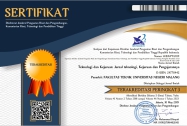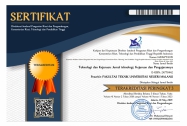Students Perception of Virtual Class-Based E-Learning as a Medium for Financial Accounting Learning
Abstract
Keywords
Full Text:
PDFReferences
Abbad, M. M., & Jaber, F. N. (2014). Evaluating E-Learning Systems: An Empirical Investigation on Students ’ Perception in Higher Education Area. International Journal of Emerging Technologies in Learning (IJET), 9(4), 27–34. https://doi.org/http://dx.doi.org/10.3991/ijet.v9i4.3480
Back, D. A., Malotky, J. Von, Sostmann, K., Peters, H., Hube, R., & Hoff, E. (2019). Orthopaedics & Traumatology: Surgery & Research Experiences with using e-learning tools in orthopedics in an uncontrolled field study application. Orthopaedics & Traumatology: Surgery & Research, 105(2), 389–393. https://doi.org/10.1016/j.otsr.2019.01.002
Bahasoan, A., Ayuandiani, W., Mukhram, M., & Rahmat, A. (2020). Effectiveness of Online Learning In Pandemic Covid-19. International Journal of Science, Technology & Management, 1(2), 100–106. https://doi.org/https://doi.org/10.46729/ijstm.v1i2.30
Besser, A., Flett, G. L., & Zeigler-hill, V. (2020). Adaptability to a Sudden Transition to Online Learning During the COVID-19 Pandemic: Understanding the Challenges for Students. Scholarship of Teaching and Learning in Psychology. Advance Online Publication, 1–21. https://doi.org/https://doi.org/10.1037/stl0000198
Boulianne, E. (2016). How should information technology be covered in the accounting program ? Canadian Journal of Administrative Sciences / Revue Canadienne Des Sciences de l’Administration, 33(4), 304–317. https://doi.org/10.1002/cjas.1405
Clark, R. C., & Mayer, R. . (2011). E-Learning and the Science of Instruction: Proven Guidelines for Consumers and Designers of Multimedia Learning. Pfeiffer: San Francisco, CA, USA.
Derlina, Sabani, & Mihardi, S. (2015). Improved Characters and Student Learning Outcomes Through Development of Character Education Based General Physics Learning Model. Journal of Education and Practice, 6(21), 162–171.
Diab, G., & Elgahsh, N. F. (2020). E-learning during COVID-19 pandemic: Obstacles faced nursing students and its effect on their attitudes while applying it. American Journal of Nursing, 9(4), 300–314. https://doi.org/http://dx.doi.org/10.11648/j.ajns.20200904.33
Ebaid, I. E. (2020). Accounting students’ perceptions on e-learning during the Covid- 19 pandemic: preliminary evidence from Saudi Arabia. Journal of Management and Business Education, 3(3), 236–249. https://doi.org/https://doi.org/10.35564/jmbe.2020.0015
Favale, T., Soro, F., Trevisan, M., Drago, I., & Mellia, M. (2020). Campus traffic and e-Learning during COVID-19 pandemic. Computer Networks, 176, 107290. https://doi.org/10.1016/j.comnet.2020.107290
Fiddin, F., & Bustami. (2021). The Use of E-Learning to The Effectiveness of Coastal Student Learning of Sumatra Island at Coronavirus Pandemic with Path Analysis. Journal of Education and Tecnology (EDUTEC), 4(3), 438–449.
Fortin, A., Viger, C., Deslandes, M., Callimaci, A., & Desforges, P. (2019). Accounting students’ choice of blended learning format and its impact on performance and satisfaction. Accounting Education, 1–31. https://doi.org/10.1080/09639284.2019.1586553
Grabinski, K., Kedzior, M., Krasodomska, J., & Herdan, A. (2020). Embedding E-Learning in Accounting Modules: The Educators’ Perspective. Education Sciences, 10(4), 97. https://doi.org/10.3390/educsci10040097
Hennink, M., Hutter, I., & Bailey, A. (2020). Qualitative Research Methods: SAGE Publications.
Indrajit, R. E., & Wibawa, B. (2021). Portrait of Higher Education in The Covid-19 Period in A Digital Literacy Perspective a Reflection on The Online Lecture Process Experience. In 2020 Fifth International Conference on Informatics and Computing (ICIC) (pp. 1–5).
Kamalia, M., & Nuriadin, I. (2021). Analysis of the mathematical reflective thinking ability of MTs students in terms of self-regulated learning during the COVID-19 pandemic. Desimal: Jurnal Matematika, 4(2), 165–176. https://doi.org/https://doi.org/10.24042/djm.v4i2.9375
Kusumaningrum, D. E., Budiarti, E. M., Triwiyanto, T., & Utari, R. (2020). The Effect of Distance Learning in an Online Learning Framework on Student Learning Independence during the Covid-19 Pandemic. In Paper presented at the 2020 6th International Conference on Education and Technology (ICET) (pp. 182–185). https://doi.org/https://doi.org/10.1109/ICET51153.2020.9276564
Mahalakshmi, K., & Radha, R. (2020). Covid 19: A Massive Exposure Towards Web Based Learning. Journal of Xidian University, 14(4), 2405–2411. https://doi.org/10.37896/jxu14.4/266
Maulana, H. A. (2021). Persepsi Mahasiswa terhadap Pembelajaran Daring di Pendidikan Tinggi Vokasi: Studi Perbandingan antara Penggunaan Google Classroom dan Zoom Meeting. Jurnal Ilmu Pendidikan, 3(1), 188–195. https://doi.org/https://doi.org/10.31004/edukatif.v3i1.259
Mccarthy, M., Kusaila, M., & Grasso, L. (2018). Intermediate accounting and auditing: Does course delivery mode impact student performance? Journal of Accounting Education, (November), 1–17. https://doi.org/10.1016/j.jaccedu.2018.12.001
Mohammed, K. S., Rashid, C. A., Salih, H. A., & Budur, T. (2020). The Role of Online Teaching Tools on the Perception of the Students during the Lockdown of Covid-19. International Journal of Social Sciences & Educational Studies, 7(3), 178–190. https://doi.org/10.23918/ijsses.v7i3p178
Morgan, J. D. (2015). Online Versus Face-to-Face Accounting Education: A Comparison of CPA Exam Outcomes Across Matched Institutions. Journal of Education for Business, 90(8), 420–426. https://doi.org/10.1080/08832323.2015.1087371
Pan, G., & Seow, P. (2016). Preparing accounting graduates for digital revolution: A critical review of information technology competencies and skills development. Journal of Education for Business, 91(3), 166–175. https://doi.org/10.1080/08832323.2016.1145622
Rachman, A. A., Rachmawati, R., Dianita, M., Sinaga, O., & Saudi, M. H. (2021). Effectiveness of E-Learning as a Learning Model for Accounting Students in the Covid-19 Pandemic at Widyatama University Bandung. Review of International Geographical Education (RIGEO), 11(6), 472–482. https://doi.org/10.48047/rigeo.11.06.59
Rahmanto, M. A., & Bunyamin. (2020). Efektivitas media pembelajaran daring melalui Google Classroom. Jurnal Pendidikan Islam, 11(2), 119–135. https://doi.org/https://doi.org/10.22236/jpi.v11i2.5974
Requena, B. E. S. (2015). Las TIC y la Educación Social en el siglo XXI. Revista de Educacion Mediatica y TIC (EDMETIC), 5(1), 8–24.
Sangrà, A., Vlachopoulos, D., & Cabrera, N. (2021). Building an Inclusive Definition of E-Learning: An Approach to the Conceptual Framework. International Review of Research in Open and Distributed Learning, 13(2), 145–149. https://doi.org/https://doi.org/10.19173/irrodl.v13i2.1161
Sohrabi, B., Vanani, I. R., & Iraj, H. (2019). The evolution of e-learning practices at the University of Tehran: A case study. Knowledge Management & E-Learning, 11(1), 20–37. Retrieved from https://doi.org/10.34105/j.kmel.2019.11.002
Sutrisna, D. (2018). Meningkatkan kemampuan literasi mahasiswa menggunakan Google Classroom. Jurnal Pendidikan Bahasa Dan Sastra Indonesia, 13(2), 69–78. https://doi.org/https://doi.org/10.25134/fjpbsi.v13i2.1544
Swain, J., & Hammond, C. (2011). The motivations and outcomes of studying for part-time mature students in higher education. International Journal of Lifelong Education, 30(5), 591–612. https://doi.org/10.1080/02601370.2011.579736
Teo, T. S. H., Kim, S. L., & Jiang, L. (2020). E-Learning Implementation in South Korea: Integrating Effectiveness and Legitimacy Perspectives. Information Systems Frontiers, 22(2), 511–528. https://doi.org//10.1007/s10796-018-9874-3
Wood, C., & Cattell, C. (2014). The motivations and outcomes of studying for part-time mature students completing higher education programmes at further education colleges. In In: Research in Post-Compulsory Education Inaugural International Research Conference (pp. 1–20). Harris Manchester College: Oxford. UK.
World Health Organization. (2020). Coronavirus disease (COVID-19) pandemic. USA: WHO.
DOI: http://dx.doi.org/10.17977/um031v45i12022p50-56
Refbacks
- There are currently no refbacks.
Copyright (c) 2023 Teknologi dan Kejuruan: Jurnal Teknologi, Kejuruan, dan Pengajarannya
Teknologi dan Kejuruan: Jurnal Teknologi, Kejuruan, dan Pengajarannya
E-ISSN 2477-0442 (online)
Contact
Faculty of Engineering, Universitas Negeri Malang (UM)
Jl. Semarang No 5 Malang 65145, Building H5, 1st Floor.
Homepage: http://journal2.um.ac.id/index.php/teknologi-kejuruan
Email: teknologikejuruan.ft@um.ac.id

This work is licensed under a Creative Commons Attribution 4.0 International License.



2.png)
1.png)
1.png)
1.png)
4.png)
1.png)
.png)

3.png)
1.png)
1.png)


